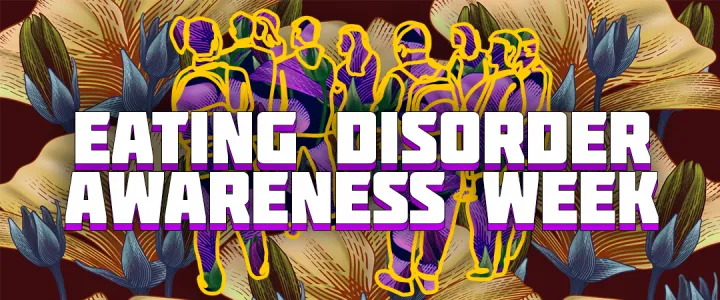Eating Disorder Awareness
Page Content

What Are Eating Disorders?
Eating disorders are serious mental health conditions that impact a person’s relationship with food, body image, and overall health.
Common Types of Eating Disorders
- Anorexia Nervosa: Characterized by extreme food restriction, intense fear of gaining weight, and distorted body image.
- Bulimia Nervosa: Involves cycles of binge eating followed by purging, often through vomiting or misuse of laxatives.
- Binge Eating Disorder: Recurrent episodes of consuming large amounts of food, often without control and without compensatory behaviours.
- Other Specified Feeding or eating disorders (OSFED): Includes behaviours that don’t fit neatly into one category but still pose serious health risks.
Warning Signs and Symptoms
- Physical: Noticeable weight fluctuations, dizziness, stomach pains, dental problems (from vomiting).
- Emotional: Mood swings, withdrawal from social activities, excessive concern about weight and body shape.
- Behavioural: Avoiding meals, extreme exercise routines, eating in secret, or hoarding food.
Myths vs. Facts
- Myth: Eating disorders are only about food and weight.
- Fact: Eating disorders are complex mental health conditions often rooted in emotional issues, stress, or trauma.
- Myth: Only women develop eating disorders.
- Fact: Eating disorders affect people of all genders, ages, and backgrounds.
- Myth: People can "just stop" unhealthy eating behaviours.
- Fact: Recovery takes time, support, and often professional treatment.
How to Support Someone with an eating disorder
- Listen without judgment and avoid making comments about their appearance or food choices.
- Encourage seeking help: Let them know that recovery is possible and that there are professionals who can provide support.
- Avoid ultimatums by forcing them to change: Instead, show empathy and provide a safe space for them to talk
Resources for Help
TU Dublin Student Counselling Service
please email counselling.service@tudublin.ie.
Location: There are counselling offices in the five main college campuses.
Hours: 9am -1pm and 2pm - 5pm.- Bodywhys – The Eating Disorders Association of Ireland
Helpline: 01 210 7906
Website: www.bodywhys.ie
Remember: You Are Not Alone
Eating disorders are treatable, and recovery is possible. If you or someone you know is struggling, please reach out. Seeking help is a sign of strength, not weakness.